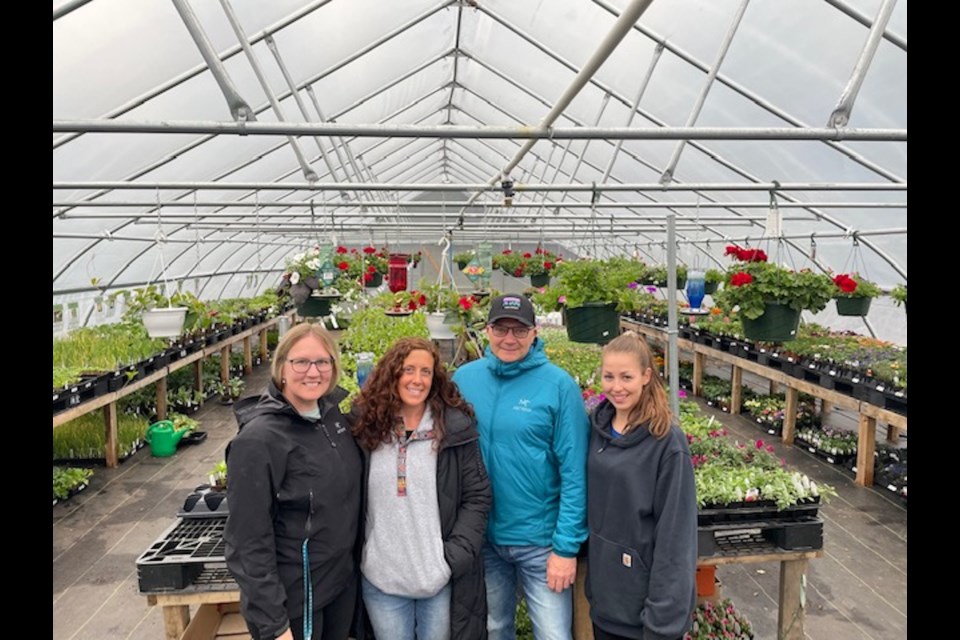It’s been a seven-year dream in the making.
Three businesses have come together with the to create a one-acre community farm in Squamish.
The freshly refurbished site has three separate plots, so each business can grow whatever crop they like, and a number of greenhouses that can now be seen from the street on the north end of the Easter Seals Camp on Government Road.
It’s a dramatic transformation for a piece of land that has been sitting unused for years, and it’s the culmination of years of planning.
They’ve got a five-year lease and they’re calling it Common Acres Community Farm.
“We are proud of how quickly this space has gone from a blank slate to now having the visions of three separate farmers coming to fruition. The best thing about this site is the diverse mix of what will be happening and growing on site at each plot throughout the year,” Rebecca Bolkoway of , one of the farms on site, told The 麻豆社国产.
Bolkoway and her brother Nick’s business was formerly called Republic Heirlooms, and operated in 麻豆社国产successfully for many years. When they were faced with the opportunity to get involved with 麻豆社国产CAN and the two other businesses, Fieldstone Garlic and they jumped at the chance.
“We became involved with 麻豆社国产CAN last year during the process of looking for a permanent location. We spent a lot of time chasing leads and searching for available land around 麻豆社国产and eventually got to the point where we were talking with people who mentioned that 麻豆社国产CAN had previously inquired with them. We realized we were on the same path, but one step behind them.”
Addressing food security
For Krystle tenBrink, the executive director of 麻豆社国产CAN, the Common Acres project has been an all-consuming passion. She has spent years looking for land to lease, visiting other established community farms to study their successes and challenges, and trying to remove barriers for local farmers to grow and provide food for the community. All of this is part of her organization’s mandate to live sustainably and address climate change.
“It has become increasingly clear that our community has very little food security in the light of natural disasters, pandemics, and the impact from the climate crisis from heat domes to flooding. Land has become unaffordable for many folks who are wanting to farm in Squamish, regardless of scale,” she said.
“Community farms are one model of farming that can help remove barriers for farmers to access land to farm and help encourage landowners to put land in production.”
To make this all happen, a number of community partners came on to support the project, including the Easter Seals, the District of Squamish, and the Investment Agriculture Foundation of B.C. This project is a direct result of one of the 52 action items in the : “increase agricultural land productivity and improve access to foodlands in the 麻豆社国产Valley, by removing barriers to support existing farm businesses, encourage new entrants, and attract new producers to the area”.
Practicing sustainable agriculture
Now that Common Acres is up and running, the three businesses are looking forward to learning from each other as they develop their land and share their produce with the community. Ultimately they’d like to be part of a larger trend towards sustainable farming in the region.
“This land has been fallow for many years and provides a great opportunity to start with organic and regenerative farming practices. Working with a collective structure allows for a sharing of resources and cross-pollination of ideas,” said Vince Hoog, owner of Fieldstone Garlic.
“The community farm is essential to being able to scale up to a market garden size. Agricultural land this close to town is rare and I feel very fortunate to have access to this land. The Common Acres initiative is a true enabler for startup agriculture.”
For Amanda Bagliore of , having a home base at Common Acres gives her a sense of long-term security that she’s been looking for.
“This project means the world to me. Having land security longer term means that I can fully maximize the potential of this project instead of having to keep spending energy resetting up season after season at a new location,” she said.
“This means that I can provide my community with consistent delivery of a beautifully grown product while giving back to the land by practicing sustainable agriculture.”
For the Bolkoways, the dream is to offer year-round locally grown veggies and plants from their plot at the farm. They’re also starting a demonstration garden to provide an example for home gardeners of different growing methods and techniques. Soon they’ll be offering seasonal events and hosting workshops, alongside their business neighbours.
“Being a part of the Common Acres project has given us the opportunity to take our business to the next level. We look forward to this space providing the community with a way to connect with us and the local food system in a meaningful way.”
Correction: The headline of this story was changed after it was first published. 'Community garden' was changed to 'community farm' to more accurately reflect the project.


.jpg;w=120;h=80;mode=crop)

